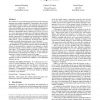Free Online Productivity Tools
i2Speak
i2Symbol
i2OCR
iTex2Img
iWeb2Print
iWeb2Shot
i2Type
iPdf2Split
iPdf2Merge
i2Bopomofo
i2Arabic
i2Style
i2Image
i2PDF
iLatex2Rtf
Sci2ools
175
click to vote
TLDI
2010
ACM
2010
ACM
F-ing modules
ML modules are a powerful language mechanism for decomposing programs into reusable components. Unfortunately, they also have a reputation for being “complex” and requiring fancy type theory that is mostly opaque to non-experts. While this reputation is certainly understandable, given the many non-standard methodologies that have been developed in the process of studying modules, we aim here to demonstrate that it is undeserved. To do so, we give a very simple elaboration semantics for a full-featured, higher-order ML-like module language. Our elaboration defines the meaning of module expressions by a straightforward, compositional translation into vanilla System Fω (the higher-order polymorphic λ-calculus), under plain Fω typing environments. We thereby show that ML modules are merely a particular mode of use of System Fω. Our module language supports the usual second-class modules with Standard ML-style generative functors and local module definitions. To demonstrate the ve...
Applicative Functor Semantics | Formal Methods | ML Modules | Simple Elaboration Semantics | TLDI 2010 |
| Added | 17 Mar 2010 |
| Updated | 17 Mar 2010 |
| Type | Conference |
| Year | 2010 |
| Where | TLDI |
| Authors | Andreas Rossberg, Claudio V. Russo, Derek Dreyer |
Comments (0)

